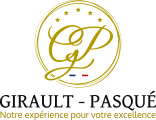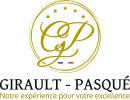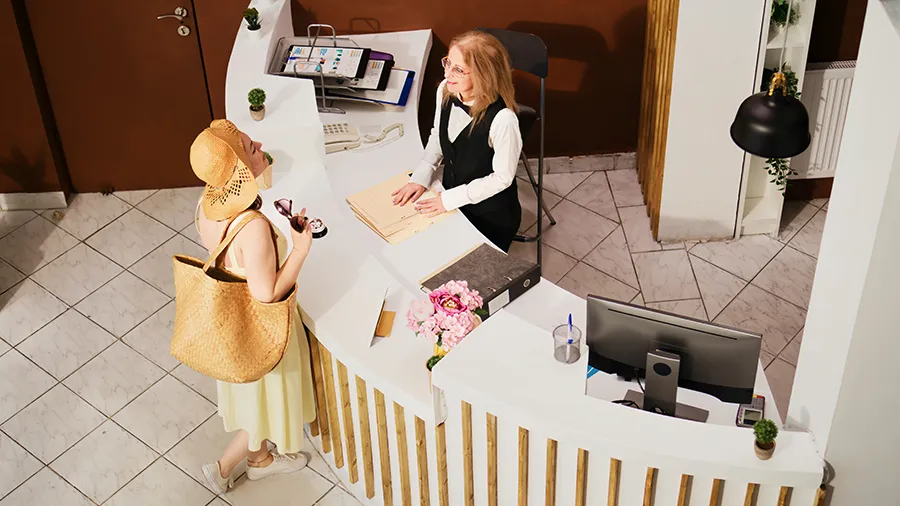Mystery shopping in the hotel industry: why and how to use a quality assessment service provider?
Today, in a sector as competitive as the hotel industry, ensuring an impeccable customer experience is a strategic challenge because there is an ever-increasing range of offers and, above all, a diversity of hotel services. Establishments must innovate in their offerings and constantly challenge themselves to maintain high standards and build customer loyalty. It is in this dynamic that the use of a mystery shopper is a powerful lever for evaluating the quality of service on an ad hoc or regular basis, this allows for the detection of areas for improvement and strengthens team commitment.
But how does a mystery shopper work in the hotel industry? What benefits can you gain from it? And how do you set up a mystery shopper mission in your hotel? Discover the answers below!
What is a mystery shopper in the hotel industry?
A mystery shopper , also called a mystery visitor , is a person tasked with pretending to be an ordinary customer, while observing and precisely evaluating the quality of service provided by a hotel establishment. They act according to a pre-defined scenario , often with a very detailed evaluation grid, in order to provide concrete and objective information.
The mystery shopper can analyze:
- Reception welcome
- The cleanliness of the premises
- Courtesy of the staff
- Compliance with brand standards
- Responsiveness in case of problems
- The overall experience (from booking to departure)
This type of mission is completely anonymous: neither employees nor management (in the case of an external audit) know when the mystery shopper will intervene, thus guaranteeing an evaluation in real conditions.
Why use a mystery shopper for a hotel?
1. Objectively assess the quality of service
The first objective is to obtain a neutral and realistic vision of what your customers are really experiencing. Unlike internal questionnaires or online reviews, which are often biased (positively or negatively), the mystery shopper report is based on precise, measurable and observable criteria . It should be noted that most tourists will rarely say it when it is good, but when they are unhappy it is a completely different story, as we often say: one unhappy customer = 10 lost customers…
2. Identify customer experience weaknesses
A mystery audit allows you to detect dysfunctions or gaps that are invisible on a daily basis:
- Waiting time too long at reception
- Your unsuitable phone tone
- Lack of information on arrival
- Insufficient cleanliness of the rooms
- Errors in breakfast service
These elements, often perceived as anecdotal, can have a strong impact on customer satisfaction.
3. Unite teams around a quality approach
Involving a mystery shopper in a constructive manner is an excellent way to mobilize teams around common goals. This allows for the recognition of good practices and the correction of deviations without resorting to sanctions.
It is also a useful tool for internal training or regular assessments.
4. Prepare a label or classification
If you are aiming for an upgrade or want to obtain a quality label (such as Destination of Excellence , Green Key, or Atout France classification ), a mystery shopper audit can play a decisive role. It allows you to prepare for the requirements and practice in real conditions .
5. Differentiate yourself in a competitive market
In a context where booking platforms promote transparency (with customer ratings, comments, etc.), a hotel that stands out for the consistency of its excellent service has a better chance of attracting and retaining its customers.
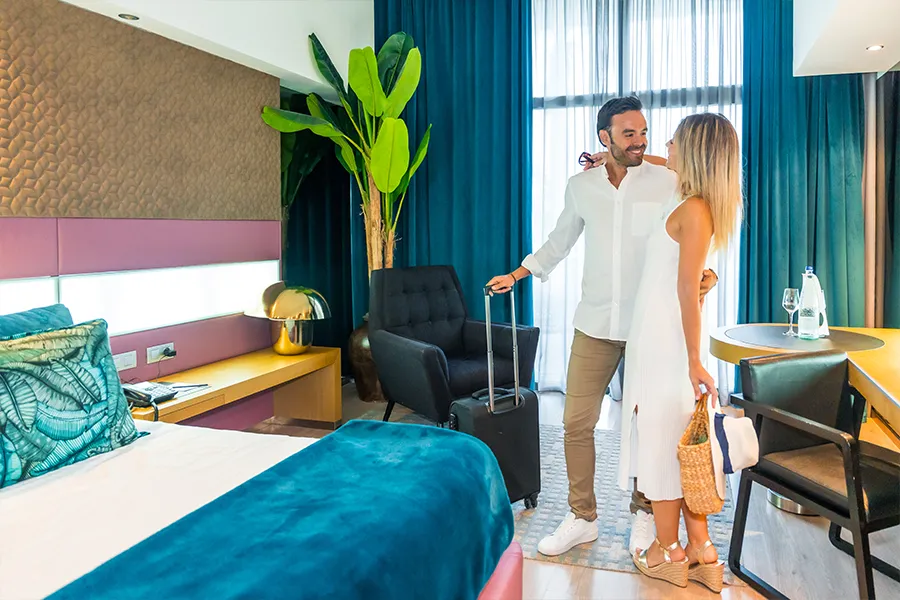
What types of services can a mystery shopper evaluate?
Depending on your needs and objectives, a mystery shopper can intervene in different areas:
The reservation
- Contact by telephone or via the website
- Clarity of information provided
- Reactivity
- Conformity between the offer sold and the offer delivered
Reception and check-in
- Waiting time at reception
- Quality of verbal and non-verbal reception
- Support for specific needs
- Friendliness and professionalism of the staff
The stay in the room
- Cleanliness
- Functional equipment
- Bedding comfort
- Noise, temperature, lighting
Additional services
- Room service
- Breakfast or catering
- Spa, swimming pool, gym
- Specific services (babysitting, concierge, etc.)
Check-out and departure
- Payment management
- Request for customer feedback
- Overall impression left
How to set up a mystery shopper audit in your hotel?
1. Define your goals
First of all, it is essential to ask yourself the right questions:
- What services would you like to evaluate?
- Is this a one-off audit or a recurring process?
- Do you want to identify problems or measure progress?
- Are you aiming for certification or upgrading?
These elements will help build a relevant and coherent scenario .
2. Choose the right service provider
There are several options for involving a mystery shopper:
- Specialized agencies : they have trained client panels, analysis tools and standardized methodologies.
- Hospitality consulting firms : often more expensive but with a tailor-made approach.
- Freelancers : more financially accessible, but require greater involvement on your part.
Make sure you choose a service provider:
- Who knows the hotel sector well
- Able to produce a structured report
- Having solid references
3. Build the mission scenario
With the help of your service provider, you must:
- Define a typical customer profile (solo, couple, family, business, etc.)
- Develop a precise itinerary (reservation, arrival, overnight stay, breakfast, departure)
- Create an evaluation grid with objective criteria
Example of criteria:
| Domain | Criteria | Note / Observation |
|---|---|---|
| Welcome | Waiting time < 2 min | |
| Communication | Smile, politeness, courtesy | |
| Bedroom | Visible cleanliness, clean linen, smell | |
| Breakfast | Varied choice, freshness of products | |
| Departure | Correct billing, thank you |
4. Let it happen… without warning the teams
To ensure the objectivity of the test, it is crucial not to warn the staff . The element of surprise allows for a better assessment of the actual level of quality delivered, independent of any bias or specific preparation.
However, this should not create a climate of mistrust. It is important to integrate this approach into a culture of continuous improvement , not in a spirit of authoritarian control.
5. Analyze the report and implement corrective actions
The mystery shopper will provide you with a detailed report , including:
- An overall rating
- Detailed comments
- Possible photos
- Recommendations
Use this report as a steering tool :
- Congratulate teams on strengths
- Organize targeted training on weaknesses
- Readjust procedures if necessary
In the long term, you can schedule an audit every 6 to 12 months to monitor progress .
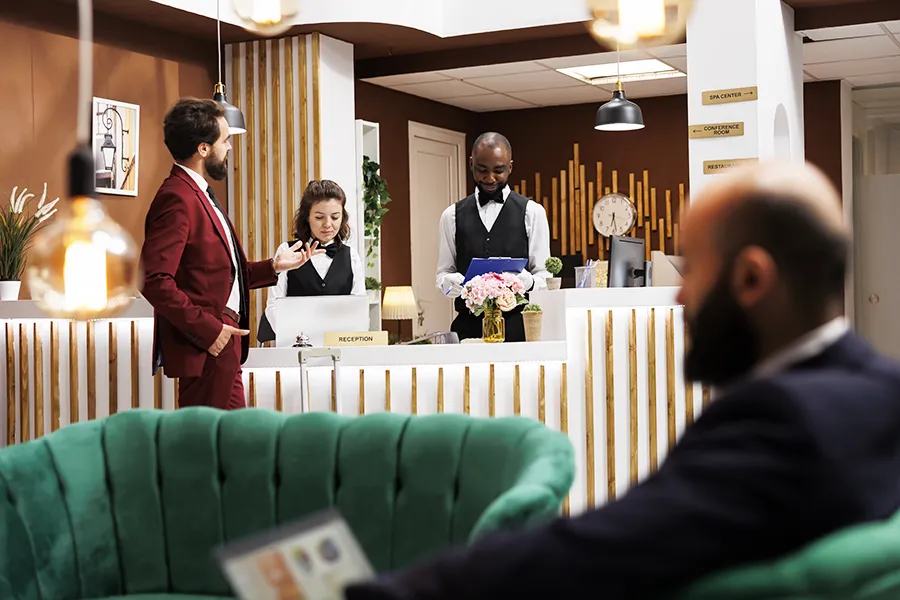
What price should you expect for a hotel mystery shopper audit?
The cost will depend on several factors:
- Scenario complexity
- Number of services tested
- Length of stay
- Provider status
Here are some average ranges:
| Type of service | Estimated price |
|---|---|
| Simple audit (1 night, breakfast) | 150 – 300 € excluding VAT |
| Complete audit with additional services | 400 – 800 € excluding VAT |
| Audit + report + recommendations | 700 – 1500 € excluding VAT |
| Recurring audit (subscription) | on quote |
Note that some agencies deduct the cost of the stay from the total cost, which makes the operation more attractive.
Mystery shopping and customer reviews: two complementary tools
It would be a shame to contrast mystery shopping with online customer reviews . Quite the opposite: these two approaches complement each other.
| Tool | Specificity |
|---|---|
| Mystery shopper | Standardized, objective and targeted assessment |
| Customer reviews | Emotional feeling, spontaneity |
A good manager will use both to adjust his quality strategy.
Case studies: How hotels use mystery shopping
4* hotel in Lyon – Independent group
Objective : prepare to obtain the Qualité Tourisme™ label
Device : 3 mystery shopper missions over 6 months, on 3 different customer profiles (business, family, couple)
Results :
- Identification of 5 deviations from the targeted standards
- Training of the reception team
- Obtaining the label in 2023
Hotel chain – Paris
Objective : To measure the uniformity of service between franchised establishments
Device : annual mystery audits, coordinated by network management
Results :
- Harmonization of procedures
- Annual bonuses indexed to mystery shopper scores
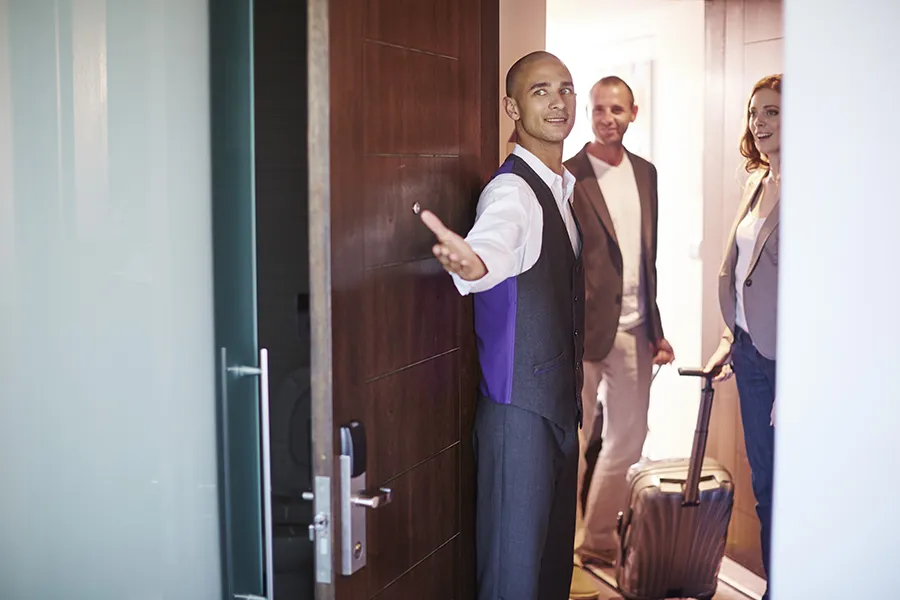
Conclusion: a performance lever serving hotel excellence
Using a mystery shopper isn’t just for large chains or luxury hotels. On the contrary, it’s an accessible, powerful, and structuring tool , available to any establishment concerned about its image, customer satisfaction, and profitability.
By engaging in a regular evaluation process, you demonstrate to your customers and your teams that quality is at the heart of your priorities.
Customer experience cannot be improvised… it must be measured, analyzed and perfected.
Summary of key steps:
- Set your goals
- Choose a qualified service provider
- Design a realistic scenario
- Let the mystery shopper act discreetly
- Analyze the report and improve your practices
